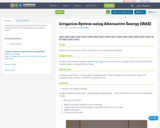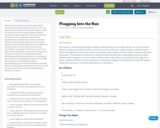
A system for the capture and distribution of rainwater and graywater for the Living Canopy school garden project.
- Material Type:
- Activity/Lab
- Lesson Plan
- Date Added:
- 06/26/2012

A system for the capture and distribution of rainwater and graywater for the Living Canopy school garden project.

This seminar explores experiments in education and discusses how education and learning might be done, through reading and discussion. This seminar is not a survey of experiments in education, but rather, its goal is to determine how learning should happen and what kinds of contexts allow it to happen.

This course provides an exploration of colonial and postcolonial clashes between theories of healing and embodiment in the African world and those of western bio-medicine. It examines how Afro-Atlantic religious traditions have challenged western conceptions of illness, healing, and the body and have also offered alternative notions of morality, rationality, kinship, gender, and sexuality. It also analyzes whether contemporary western bio-medical interventions reinforce colonial or imperial power in the effort to promote global health in Africa and the African diaspora.

This hands-on construction project gets students cooking during a solar energy science unit. The class study begins by acting out the Earth's rotation around the sun to see how that causes shadows. Students conduct several investigations of the Earth's position and shadows with compass and thermometer measurements and observation. They research the dilemma of using fossil fuels and how solar energy might solve this problem. Students work as engineers, and their task is to build a solar cooker that can successfully cook an egg. If this works, it may be the basis for more exploration on using solar energy as an alternative to fossil fuels. Students display their learning in multimedia presentations or newsletters.
This unit plan was originally developed by the Intel® Teach program as an exemplary unit plan demonstrating some of the best attributes of teaching with technology. More information about this and other unit plans can be found in the Designing Effective Projects curriculum.

This course is for students who want to know how the dollars we spend on national security relate to military forces, systems, and policy choices, and who wish to develop a personal tool kit for framing and assessing defense policy alternatives.